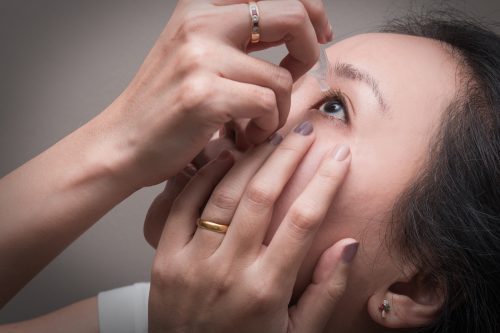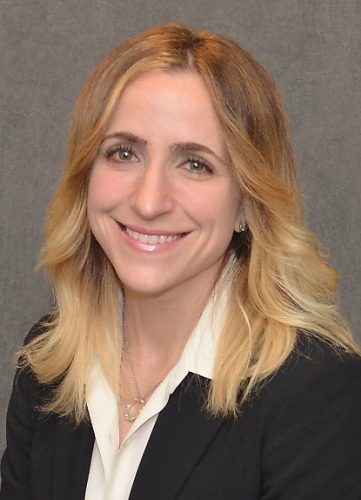Patients are buzzing about a new eye drop, Vuity, that aims to help people who have trouble seeing close-up objects clearly. Focus spoke with vision expert Kathryn Hatch, MD, to weigh in on the new medication, who might benefit most, and whether users can throw away their reading glasses for good.
A recently approved medication might give some patients hope that they don’t need to rely on their reading glasses as much.
Vuity is an eye drop that was approved by the U.S. Food and Drug Administration in October to treat presbyopia— the blurry close-up vision that typically starts to develop after age 40. The drug, which is currently geared toward people ages 40-55, can be prescribed by an ophthalmologist or optometrist. In clinical studies, Vuity was shown to temporarily improve near-distance vision for up to six hours or more. The availability of this new medication can potentially help millions of Americans who struggle with reading and other daily visual function.
“We’re really excited to have a new tool in our toolbox for patients,” said Kathryn Hatch, MD, director of the Refractive Surgery Service at Mass Eye and Ear. “We haven’t had an ideal solution for this problem, which is so prevalent. To have a noninvasive option, an eye drop someone can use when they want to, can be very helpful.”
Trouble seeing close-up extremely common with age
Presbyopia—a normal part of aging—refers to the gradual and progressive loss of a person’s ability to see objects at a near distance.
An estimated 128 million Americans, or 89 percent of all U.S. adults over the age of 45, have presbyopia, according to Mass Eye and Ear research.
Presbyopia occurs when the lens of the eye, which enables focusing on objects at various distances, loses its elasticity. When a person is young the lens is flexible and can easily change shape to focus, a process known as accommodation. However, as people age, they gradually lose the accommodation.
People with presbyopia typically compensate for their struggles by holding reading materials farther away in order to see the text clearly.
“I explain presbyopia to patients as a camera lens losing its ability to zoom in as we age,” explained Dr. Hatch.
How the Vuity eye drops work
 Vuity works by temporarily decreasing or constricting the size of the pupil, which allows less light into the lens, resulting in increased focus. In photography, this principle is applied by increasing the f-stop number on a camera, which decreases the aperture—the hole in the lens which light travels through—allowing for a less blurry picture.
Vuity works by temporarily decreasing or constricting the size of the pupil, which allows less light into the lens, resulting in increased focus. In photography, this principle is applied by increasing the f-stop number on a camera, which decreases the aperture—the hole in the lens which light travels through—allowing for a less blurry picture.
“The medication basically creates a pinhole effect to make the pupil smaller to allow for better vision,” said Dr. Hatch.
Vuity is far from a new drug. For decades, it has been prescribed in higher doses for glaucoma treatment. What is different now is its formulation and delivery, Dr. Hatch pointed out.
Results vary on how long Vuity lasts, but six to eight hours is the approximate timeframe it works, according to Dr. Hatch. This depends on a host of factors, including the patient’s age, prescription, pupil size, and starting point of their visual deficit. Every person’s lens is different, Dr. Hatch added, so the treatment might work better for some and not others.
Side effects reported in the clinical trial included headaches and red eyes, and a 30-day supply of the eye drop will cost about $80, CBS News reported.
Adding to existing options
There are other existing treatment options for patients besides reading glasses and the new Vuity eye drops.
Some patients wear bifocals or trifocals, which divide the lenses of glasses to correct for close-up and distance vision. Others wear monovision contact lenses that allow for close-up vision in one eye, while the other eye has a lens for distance vision, or multifocal contacts which contain multiple zones of focus.
Some patients opt for a surgical procedure called monovision with laser correction, in which one eye is corrected for distance vision, and the other is corrected for near vision. Additionally, patients who undergo cataract surgery may choose a presbyopia-correcting intraocular lens to help with near vision.
One benefit of the drops, Dr. Hatch noted, is that they are temporary, and the effect is reversible, so it’s less of a commitment than other vision correcting methods.
There are currently other companies developing classes of eye drop medications similar to Vuity, and Dr. Hatch expects to see more options for patients in the coming years. She also anticipates more studies may evaluate safety and effectiveness of these drops in in older age groups, or for off-label uses, such as for those who have undergone cataract surgery.
If patients opt for the eye drops, they ultimately need to manage their expectations however, as a patient may still might need reading glasses for some activities.
“Vuity is not a curative treatment per se, but if they reduce or eliminate your need for reading glasses, that could be a game changer for many patients,” said Dr. Hatch.
Patients interested in Vuity should reach out to their eye doctors to see if the eye drops are an option for them.
Dr. Hatch is on the medical advisory board for LENZ, another company developing presbyopia treatments.
About our expert
 Kathryn Hatch, MD, is Director of the Refractive Surgery Service and Site Director at Mass Eye and Ear, Waltham. She specializes in all laser refractive surgery techniques, complex cataract surgery, corneal cross-linking, and corneal transplants. She sees patients at the Waltham location.
Kathryn Hatch, MD, is Director of the Refractive Surgery Service and Site Director at Mass Eye and Ear, Waltham. She specializes in all laser refractive surgery techniques, complex cataract surgery, corneal cross-linking, and corneal transplants. She sees patients at the Waltham location.
I have used mono-vision contact lenses for more than 20 years. In the past 6 years I could see better without contact lenses or glasses. I am 83 years old. I had cataract surgery in my left eye three years ago. It did not work out. Is Dr. Hatch someone I should see ? Carol Cross
Hi Carol, one of the cataract and refractive surgeons would be great for a consultation. They can be reached at either 617-573-3202, or for our Waltham office (where Dr. Hatch and colleagues are), 781-890-1023.
I want to be part of your study, I am currently a Mass eye and ear patient
Hi Amos thanks for reading and your comment, we don’t know of any ongoing studies on this medication. But since this is FDA-approved, you can contact your Mass Eye and Ear eye doctor to discuss more if this is a treatment option for you.
Hello, is there any research or treatments going on for MacTel? Thank you
Hi John, Mass Eye and Ear’s retina service has doctors that see patients with MacTel. You can call 617-573-3202 for an appointment. https://www.masseyeandear.org/specialties/retina
How do I get a prescription for drug?
Hi Ray, your optometrist or ophthalmologist can prescribe this medication. For an appointment with Mass Eye and Ear, please call 617-573-3202.
.